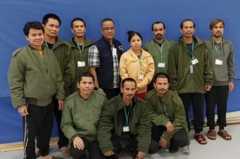Israeli authorities say 14 hostages held by Hamas will be released on Saturday. As part of the Qatar-brokered deal, Israel will release 42 Palestinian prisoners
- It's the second day of a four-day pause in fighting between Israel and Hamas in the Gaza Strip
- Friday saw the release of 24 hostages - they included 13 Israelis, 10 Thais and one Filipino national
- 39 Palestinian prisoners were released as part of the deal
- The biggest humanitarian convoy since the start of the war entered Gaza on Friday, carrying fuel, food and medical supplies
- Hamas’s attacks on 7 October killed 1,200 people, with about 240 taken hostage
- Since then, Gaza's Hamas-run health ministry says more than 14,500 people have been killed in Israel's retaliatory campaign.
A campaign group that speaks on behalf of the families of those taken hostage by Hamas has released a photo of the Thai and Filipino nationals who were released by Hamas on Friday.
The Hostages and Missing Families Forum has listed their names as:
Gelienor "Jimmy" Pacheco, Natthawaree Mulakan, Santi Bunphrom, Boonthom Pankhong, Mongkol Phajuabbun, Withun Phumi, Vichai Kalapat, Bancha Kongmani, Buddi Sengbun, Uthai Thunsri and Uthai Sengnual.
The organisation said it was in continuous contact with foreign embassies and will continue to coordinate with them until all the hostages are safely returned.
Over time - and given the precedents - even Israelis may come to consider this a "fair deal".
Not least, there is a tactical advantage in having a pause in combat. It will allow Hamas to recover from weeks of gruelling combat in which it has largely held up to the Israeli assault, but also suffered some significant losses.
There can be no doubt that Hamas will use some of this time to re-establish chains of command, restock supplies, and relocate fighters to positions from which they can do most damage to the advancing Israeli troops.
Importantly, it will also provide them with an opportunity to move the remaining hostages to locations from which Israel will find it even more difficult to free them.
In short, even if there are no other, undeclared benefits, the hostage deal offers Hamas significant tactical and strategic advantages.
While it is undoubtedly good news for the released and their families, the hard truth is that it will potentially make it more difficult - and costly - to free those that are left behind.
Israeli authorities have said that 14 Israeli hostages being held by Hamas will be released on Saturday in exchange for 42 Palestinian prisoners.
It's the second day of a temporary ceasefire in a deal brokered by Qatar, which mandates exchanges at a ratio of three to one.
The temporary ceasefire deal between Israel and Hamas offers breathing space in the ongoing conflict. But it doesn't signal an end to the hostage crisis - or even the beginning of its end. If anything, it provides Hamas with an advantage in what is likely to become a drawn-out, open-ended drama.
The release of dozens of elderly, women and child hostages over the coming days is going to be greeted with huge relief by Israelis.
It means Hamas will continue to hold more than 150 hostages but for them, this may turn out to be more advantageous than the larger number.
For one, the nearly 240 hostages originally taken probably imposed a huge burden on the organisation. Hostages need to be constantly looked after, monitored, and - if necessary - moved. If some of them are old, sick, or have special medical needs, it makes things more complicated.
By "getting rid" of anyone requiring special attention, Hamas is therefore not displaying compassion, but primarily freeing up resources that are needed elsewhere. This is especially true for an estimated two dozen labourers from Thailand and Nepal who hold no strategic value to Hamas, because they are neither Israeli nor Jewish.
Another reason is that the remaining hostages are easier to portray as "legitimate", because they are mostly Israeli soldiers or men of fighting age.
Hamas will argue that they are "enemy combatants" - even Prisoners of War.
Crucially, this will increase pressure on the Netanyahu government to agree to a prisoner swap.
Just like in the past, when Israel agreed to release hundreds - on one occasion: over a thousand - Palestinians in return for small numbers of Israeli soldiers, Hamas will demand the freeing of thousands of its members that are currently in Israeli prisons.
EVEN MORE DETAILS AT: https://www.bbc.co.uk/news/live/world-middle-east-67527098

No comments:
Post a Comment